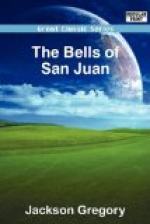Her eyes followed him, frankly admiring now; so she might have looked at any other of nature’s triumphant creations. Then, before he had gone a score of yards, she saw how a little tightening of his horse’s reins had brought the big brute down from a swinging gallop to a dead standstill. The bell was tolling again.
Again he was calling to her, again, swinging about, he had ridden to her side. Now his voice like his eyes, was ominously stern.
“Who is it?” he demanded.
“I don’t know,” she told him, marvelling at the look on his face. His emotion was purely one of anger, mounting anger that a man was dead? “The man who rings the bells told me that he thought it must be a sheepman from Las Palmas. He went to see. . . . I didn’t wait. . . .”
Nor did this man wait now. Again he had wheeled; now he was racing along the arroyo, urging a tired horse that he might lose no unnecessary handful of moments. And as he went she heard him curse savagely under his breath and knew that he had forgotten her in the thoughts which had been released by the dull booming of a bell.
CHAPTER III
A MAN’S BOOTS
In the bar at the Casa Blanca, a long, wide room, low-ceilinged and with cool, sprinkled floor, a score of men had congregated. For the most part they were silent, content to look at the signs left by the recent shooting and to have what scraps of explanation were vouchsafed them. And these were meagre enough. The man who had done the shooting was sullen and self-contained. The dead man . . . it was the sheepman from Las Palmas . . . lay in an adjoining card-room, stark under the blanket which the large hands of Jim Galloway had drawn over him.
When the clatter of hoofs rang out in the street a couple of men went to the door. Coming back, “It is the sheriff,” they said.
Roderick Norton, entering swiftly, his spurs dragging and jangling, swept the faces in the room with eyes which had in them none of that human glint of good-will which the girl at the arroyo had glimpsed in them. Again they were steely, angry, bespeaking both threat and suspicion.
“Who is it this time?” he demanded sharply.
“Bisbee, from Las Palmas,” they told him.
“Who did it?” came the quick question. And then, before an answer could come, his voice ringing with the anger in it: “Antone or Kid Rickard? Which one?”
He had shifted his rifle so that it was caught up under his left arm. His right hand, frank and unhidden, rested upon the butt of the heavy-caliber revolver sagging from his belt. Standing just within the room, he had stepped to one side of the doorway so that the wall was at his back.
“It was the Kid,” some one answered, and was continuing, “He says it was self-defense . . .” when Norton cut in bluntly:
“Was Galloway here when it happened?”




